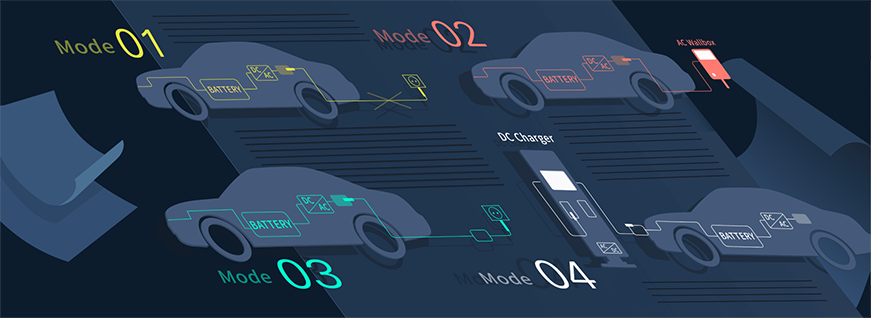EV 충전기
EV 충전기
2020년 EU의 CO2 배출 규제가 더욱 강화됨에 따라 전기차 제조사들은 장기적으로 전기차 판매율이 급격하게 상승할 것으로 내다보고 있다.
전기자동차용 충전기는 전기자동차의 보급과 보급에 있어 가장 큰 요인으로 작용하고 있으며, 보다 안정적이고 혁신적인 전기자동차용 충전기를 개발하는 기업들이 전기자동차 충전기 시대를 선도할 것입니다.
특히 제이앤디의 미래지향적 전기차 충전 개발을 위한 첨단 기술을 적용한 전류 센서는 다양한 충전 모드가 가져올 다양한 디자인에 최적화된 가이드를 제공한다.

3가지 주요 EV 충전기 모드가 있습니다.
1) 모드 4: DC EV 충전기
모드 4 충전 시스템은 그리드에서 AC를 DC로 변환하고 인버터를 사용하지 않고 차량을 충전합니다. 이 모드는 IEC 61851-23 표준에 의해 정의되며 AC/DC 전원 변환, 감전으로부터 사람을 보호, 지불과 같은 기능을 통합합니다.
제이앤디전자는 Mode 4의 안전성과 효율성을 위해 Mode 4를 구성하는 소자들을 자체적으로 개발 및 생산하고 있습니다. 이러한 장치들과 통합되어 안전성과 효율성을 향상시키는 최적화된 CT입니다.
구체적으로 3상 교류 전력 측정 시 DC의 영향을 받지 않도록 DC Immunity 기능을 추가하여 Mode 4에 적합한 DC Tolerance CT인 J&D JDTN 시리즈 CT를 출시한다. 고효율 AC에 적용할 수 있도록 IACT 시리즈 CT도 출시 -> DC 전원 모듈. 또한, 수익 등급 DC 미터에 사용할 수 있도록 IDCS 시리즈를 출시했습니다.
2) 모드 3: AC EV 충전기
모드 3은 AC 공급 네트워크에 연결되어 작동하는 AC->AC EV 충전기입니다. 일반적으로 전기 자동차를 소유한 가정이나 공항, 호텔, 직장 및 대리점과 같은 많은 공공 상업 장소에 있습니다.
제이앤디전자는 Mode 3의 안전성과 효율성을 위해 Mode 3를 구성하는 장치들을 자체적으로 개발 생산하고 있습니다. 이를 바탕으로 AC EV 완속충전기와 AC 스마트미터를 개발하고 있으며, 이러한 장치와 통합하여 안전성과 효율성을 향상시키기 위해 출시되었습니다.
즉, AC 스마트미터의 경우 AC 전류가 입력될 때 DC의 영향을 받지 않도록 JDTN 시리즈 DC Tolerance CT와 잔류 전류에 대한 IEC 62955 안전 인증 규격을 인증받은 RCD 시리즈 CT가 개발되었습니다. 모니터링.
무엇보다 J&D CT는 RCD(Residual Current Device)로 안전인증 IEC 62955를 준수하여 누설전류를 감지하는 기능을 가지고 있습니다. 사용자의 모든 가정 전기 패널에서 30mA(AC) 및 6mA(DC) 이상의 누설 전류가 감지됩니다.
3) 모드 2: AC 전력 측정
모드 2는 표준 소켓 콘센트에 연결된 케이블과 플러그를 통해 전기 자동차 AC 전원을 공급하고 충전하는 모드입니다. 이러한 케이블 라인은 일반적으로 전기 자동차의 트렁크에 있으며 충전 시 소켓 콘센트에 연결됩니다.
여기서 콘센트와 전기차 사이에 놓인 감전을 보호하는 기능과 시스템이 중요하다. 즉, IC-CPD(In-Cable Control and Protection Device)라고 하는 이러한 장치는 안전 인증 IEC 62752 표준을 충족해야 합니다.
J&D Electronics는 이러한 Mode 2의 안전성과 효율을 향상시키기 위해 최적화된 CT를 개발하였다. 무엇보다 J&D CT는 안전인증 IEC 62752를 준수하여 누설전류를 감지할 수 있는 RCD(Residual Current Device)이다. 사용자의 모든 가전 패널에서 30mA(AC), 6mA(DC) 이상의 누설 전류가 감지되는 순간 가택의 전원을 차단하는 기능.
또한 J&D JDTN 시리즈는 DC 공차 CT로 AC전원 공급 시 DC의 영향을 받지 않아 안전성과 효율 최적화를 실현하는데 적합하다.
– RCD 유형
– AC/DC 잔류 전류 장치(솔리드 코어)
– 솔리드 코어 변류기(DC 공차)

